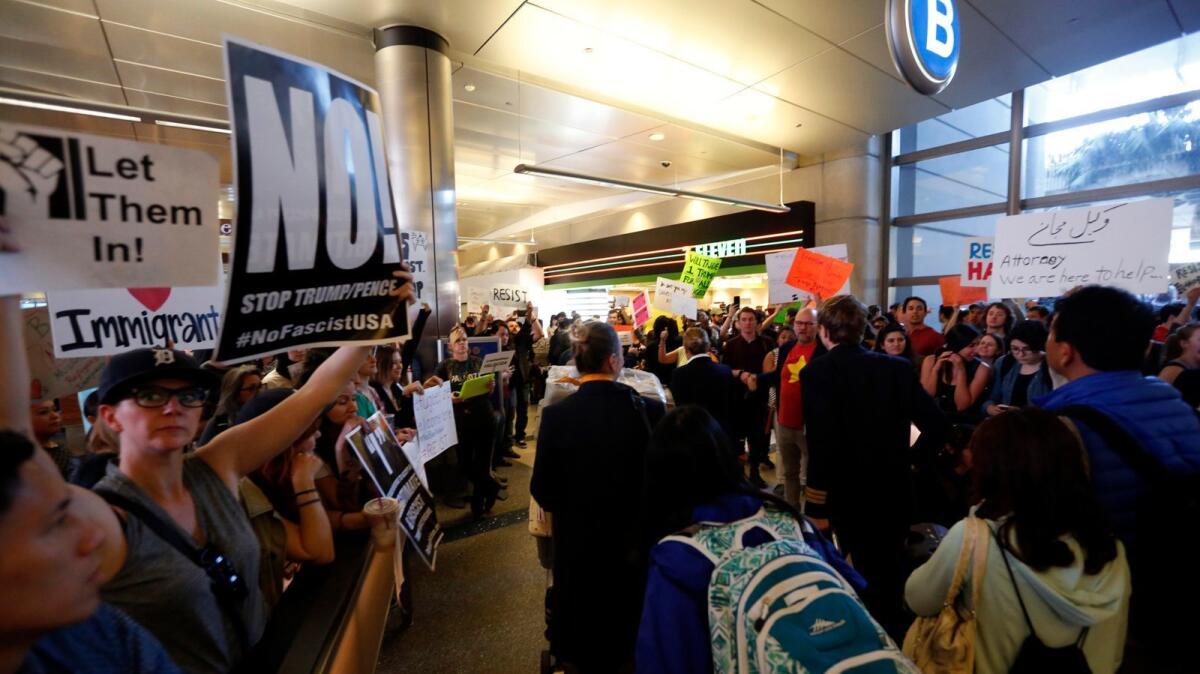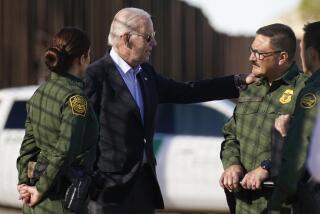Airlines caught by Trump travel ban forced to adjust on the fly

The travel ban imposed by President Trump has had a minor impact on U.S.-based airlines but has forced foreign airlines to scramble, even prompting one carrier to switch out a flight crew to comply with the action.
Trump’s executive order to temporarily bar travelers from Iran, Iraq, Syria, Sudan, Yemen, Somalia and Libya has sparked protests at some major airports, causing several flight delays. There were no reports of canceled flights.
For the record:
9:29 p.m. Nov. 15, 2024An earlier version of this story said Emirates flies seven direct flights from Abu Dhabi. Emirates flies 17 flights a day to the U.S.
At Los Angeles International Airport, a total of 15 flights — six international flights and nine domestic flights — were delayed Sunday because flight crews and passengers were hampered getting past protesters to their gates.
No U.S.-based carrier flies directly to any of the seven countries listed in the temporary ban, and visitors from those countries make up only a fraction of all visitors to the U.S.
“The travel volume between the U.S. and the affected countries is not very large compared to the volume to other places,” said Jan Brueckner, an economics professor at UC Irvine and expert on the airline industry. “So I don’t think it’s a huge thing.”
But other experts worry that the ban may send a message that the U.S. is not as welcoming to foreign tourists as it was in the past.
“If the U.S. is viewed as a hostile environment, not a welcoming destination, we will see fewer international visitors this year,” said Henry Harteveldt, an industry analyst with Atmosphere Research Group.
That could be a major blow to the nation’s travel industry, which supports 15.1 million jobs.
The U.S. Travel Assn., the trade group for the nation’s travel industry, said it hopes that the Trump administration does not delay reviewing the procedures for approving visas from the seven countries. The executive order keeps out refugees for 120 days and travelers from the seven predominantly Muslim nations out for three months.
“The real trouble would come if the chaos and confusion is protracted,” said Jonathan Grella, executive vice president at the association.
U.S. carriers said they are rebooking and offering full refunds to travelers who had to cancel flights to the U.S. For those travelers who landed in the U.S. with a one-way ticket and were forced by the executive order to fly back, the airlines picked up the cost of the return flight.
The biggest impact of the ban has been on foreign-based airlines, which complained that Trump’s executive order caught them by surprise.
“The executive order was issued without prior coordination or warning, causing confusion among both airlines and travelers,” the International Air Transport Assn., said in a statement Monday. “It also placed additional burdens on airlines to comply with unclear requirements, to bear implementation costs and to face potential penalties for non-compliance.”
The trade group represents 265 airlines worldwide, including Qatar, Emirates, Etihad and Iran Air, carriers that fly out of some of the countries named in the ban.
Emirates Airline, the world’s largest long-haul carrier with 17 flights a day to the U.S. , said it was forced to change pilots and flight attendants on some flights to the U.S. to keep from violating the new ban. Trump’s executive order did not exclude airline crew members with passports from those countries named in the ban.
Emirates declined to elaborate on the staff changes, saying only: “We have made the necessary adjustments to our crewing, to comply with the latest requirements. Emirates continues to operate flights to the U.S. as scheduled.”
Travel from the Middle East and Africa represents only about 5% of all overseas visitors to the U.S., according to the most recent data from the U.S. Department of Commerce. Mexico, Canada and Europe represent the biggest markets for foreign tourism to the U.S.
Still, the travel ban continued to spark controversy.
A Los Angeles travel agent who specializes in booking trips for Iranian Americans said her clients are afraid to leave the U.S. for fear that they cannot return. “Even Iranian-Americans, they don’t want to go anywhere,” said Nancy Amiri of Amiri Travel.
Suiteness, an online travel site, announced that in response to the temporary ban it has removed all of Trump’s hotels from its travel site.
“As supporters of diversity and the collective strength of the human spirit, we at Suiteness refuse to profit off of Trump Hotel listings while innocents suffer because of this executive action,” said Robbie Bhathal, chief executive of Suiteness.
To read more about the travel and tourism industries, follow @hugomartin on Twitter.
More to Read
Inside the business of entertainment
The Wide Shot brings you news, analysis and insights on everything from streaming wars to production — and what it all means for the future.
You may occasionally receive promotional content from the Los Angeles Times.











